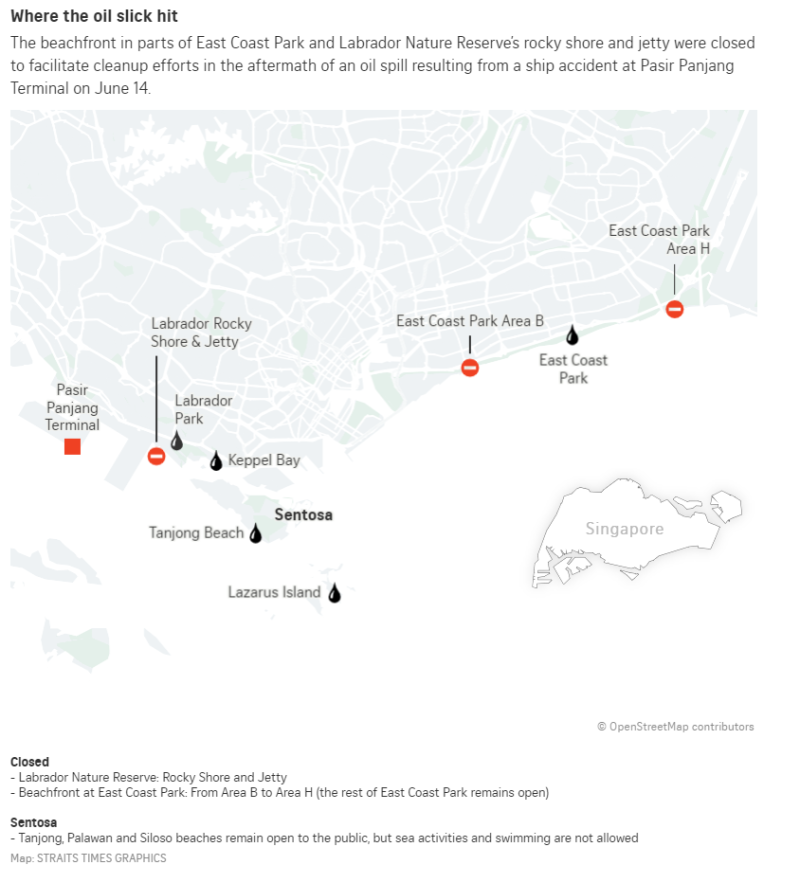Oil spill incident: Cleanup expands to more areas, including Changi
SINGAPORE — The authorities here are expanding cleanup efforts to more areas following a major oil spill on June 14, with some oil leaking from a damaged cargo tank at Pasir Panjang Terminal having spread to the waters off Changi on June 17.
As at June 17, some 1,500m of booms have been deployed to contain the oil spill, with an additional 1,600m to be deployed at several beaches on Sentosa Island and Labrador Nature Reserve by June 18, as well as at Southern Islands, according to a joint statement by the Maritime and Port Authority of Singapore, National Environment Agency (NEA), National Parks Board (NParks), national water agency PUB, Sentosa Development Corporation and Singapore Food Agency.
Booms have also been installed along stretches of East Coast Park beaches that are badly affected, and at canal openings, to trap oil and prevent it from flowing back into the canal.

They will also be placed off Changi East as a preventive measure.
"Some of the oil has been seen off Changi today," the joint statement said, adding that oil absorbent booms have been pre-emptively deployed off biodiversity-sensitive areas at Chek Jawa Wetlands at Pulau Ubin, Coney Island Park and Pasir Ris Park.
N. Sivasothi, a senior lecturer at National University of Singapore, said the movement of oil towards Singapore's eastern waters was expected, given the current south-west monsoon season with winds blowing from the south.
"This is still disconcerting. We are certainly hoping that the volume of oil has already been significantly reduced by the cleanup teams who are working hard to remove it."

Muhammad Nasry, Executive director of Singapore Youth Voices for Biodiversity, said Chek Jawa is home to mangrove, mudflat and seagrass habitats.
Oil slicks can block light from reaching seagrasses, which require sunshine to photosynthesise. Seagrasses are also known to lose chlorophyll — the compound in plants that enable them to convert sunshine to nutrition — when exposed to chemical pollutants, he said.
"If oil is deposited onto a sandy shoreline, the oiled-up sand can be scooped up easily. But in mangrove habitats, if the oil goes in, it's not going to come out easily," he added.
The authorities said additional containment and absorbent booms will be deployed over the next few days to protect fish farms at the East Johor Strait, Chek Jawa Wetlands and Changi Creek.
A Current Buster system, a specialised oil floating containment and recovery device deployed from vessels, will be used on June 18 off the Changi Exhibition Centre as a pre-emptive measure.
Each system consists of a boom with a skirt that extends below the water surface to enclose and collect oil on the water surface.

While West Coast Park is not affected, oil absorbent booms were also deployed at the park to protect the mangroves at the Marsh Garden, said the statement.
Sivasothi said it is encouraging to hear that the mitigation protocols have been activated.
"The early deployment will certainly help protect sensitive biodiversity areas and fish farms in the eastern Johor Strait," he said.
On June 14, the Netherlands-flagged dredger Vox Maxima hit a stationary Singapore-flagged bunker vessel, Marine Honour, at Pasir Panjang Terminal. The dredger had suffered a sudden loss of engine and steering control.

The impact created a rupture in one of the oil tanks of Marine Honour, causing oil to leak into the sea. Residents and visitors to the affected areas spoke of a "strong smell of oil" following the incident.
NEA has been conducting daily tests since June 15, and found the air quality at affected areas around Sentosa, East Coast Park and Labrador Nature Reserve to be well within "safe levels" so far, according to the statement.
Meanwhile, the public is advised to avoid swimming at Changi Beach, or engage in other water activities there.

To facilitate cleanup efforts, the following beaches will be closed until further notice.
- Beaches at East Coast Park (from Area B to H)
- Labrador Nature Reserve (Jetty and Rocky Shore)
- Sentosa beaches remain open to public, but sea activities and swimming are not allowed at Tanjong, Palawan and Siloso beaches
- Beaches at St John's, Lazarus and Kusu islands
NParks said it has received overwhelming response from members of the public who volunteered their help, but for their safety, volunteers will not be deployed for shoreline cleanup.

In a Facebook post on June 17, Minister for National Development Desmond Lee reminded the public to stay away from beachfronts, as the cleanup operations should be carried out by professionals.
The MP for West Coast GRC also thanked volunteers who helped with patrols at East Coast Park and West Coast Park, as well as those who helped with surveys at Southern Islands over the weekend.
ALSO READ: Oil spill incident: Local fish remain safe for consumption, says SFA
This article was first published in The Straits Times. Permission required for reproduction.
Disclaimer: The copyright of this article belongs to the original author. Reposting this article is solely for the purpose of information dissemination and does not constitute any investment advice. If there is any infringement, please contact us immediately. We will make corrections or deletions as necessary. Thank you.







